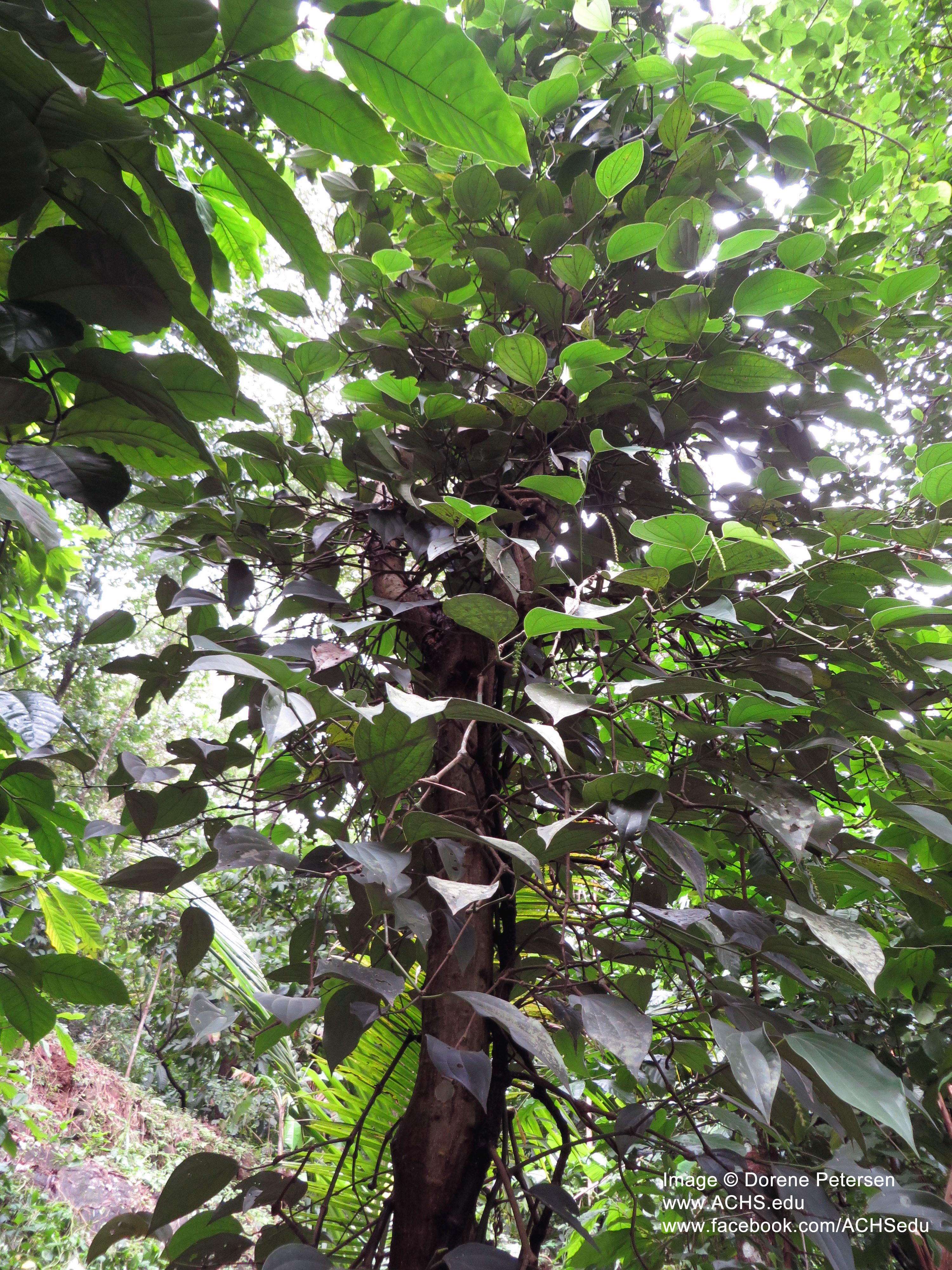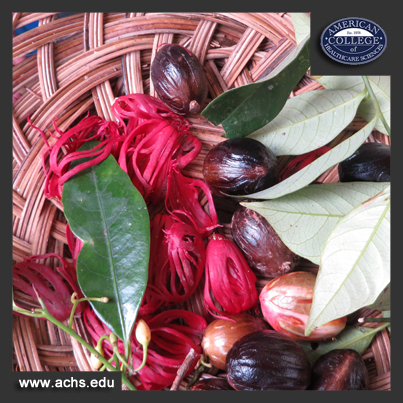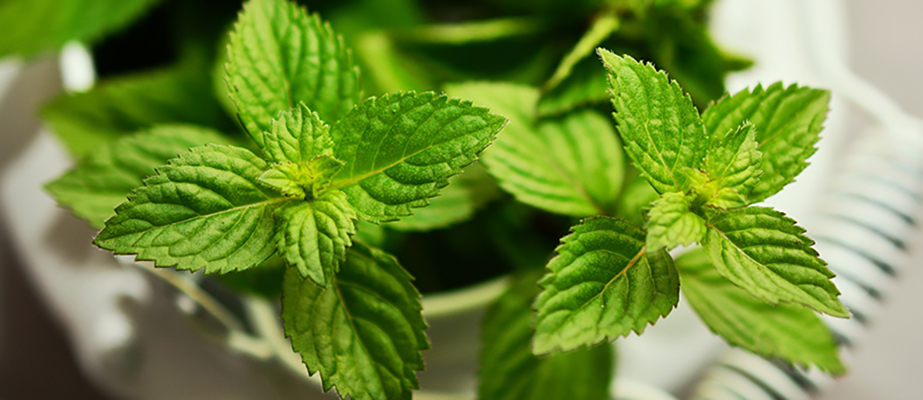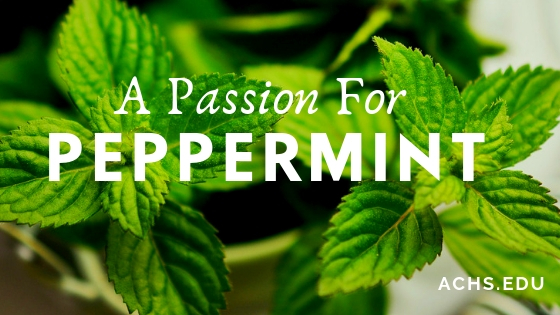As our bus bumped along on the upward journey to the mountain village of Meenar on our way to where the last, largest remaining sandalwood forest is managed by the Kerala Forest Department, I was thrilled to spot what looked like black pepper clambering and twining over palms and other trees.
I was excited when we made a lunch stop. The rich spice landscape of the State of Kerala unveiled not just pepper but cardamom (Elettaria cardamomum), cocoa, ylang ylang (Cananga odorata var. genuina), and nutmeg (Myristica fragrans).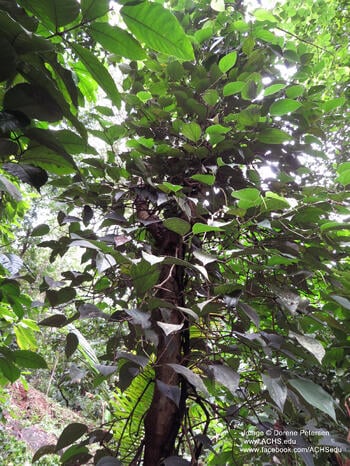 Black pepper is one of my favorite spices and aromatherapy essential oils. Chewing on the fresh green peppercorn was a highlight. It was peppery but with a fresh green overlay that zinged on my palate.
Black pepper is one of my favorite spices and aromatherapy essential oils. Chewing on the fresh green peppercorn was a highlight. It was peppery but with a fresh green overlay that zinged on my palate.
I was intrigued at the diverse farming style. Cardamom, black pepper, coconuts, and cocoa are all intermixed. Piper nigrum, or black pepper, belongs to the Piperaceae family, which is not a common essential oil family. Black pepper has a long rich history, and has influenced explorers such as Vasco de Gama and entire nations to colonize this area to exploit the spice, amongst other things. Black pepper is one of the oldest and most important spices.
As I slipped and slid up the muddy monsoon-drenched track to the black pepper plantation, I recalled that it was used as part of the embalming process by the Egyptians. Just imagine if granny died and you were out of black pepper! The Greeks also used it in the 4th century B.C., and the Romans apparently imported it from the East. It was one of the first spices to travel the spice route and perhaps one of the most expensive and treasured. To protect the source, the traders said it came from a “sacred mountain top occupied by the gods," and here I was climbing up the sacred mountain top occupied by the gods. Pliny spoke of it as “more expensive than gold.” The value of this commodity is still evident in the large and impressive mansion-like houses set back in lush manicured gardens. They are a stark contrast to the shacks in the small villages we passed through and the old ladies bent in half under their loads of wood and water.
I finally reached the thickly forested slope and was up close and personal with a black pepper climbing vine that must have been at least 30-ft. tall. The stems were at least 2-in thick 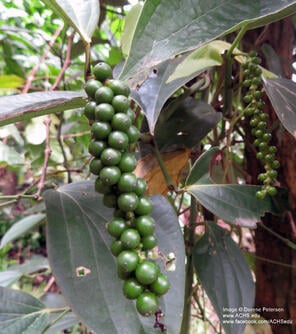 with numerous short roots that provided support for the plant on the host. It is a mass of textured ovate-shaped deep green leaves. It was flourishing, obviously enjoying the warm, humid, tropical environment with the heavy monsoon rainfall, but where there are spells of dry weather in between the warmth. I chatted with our expert guide, Jairag, and he told me pepper is propagated by cuttings and takes about six to seven years to produce a good crop. A vine usually produces for 15 years. The fruit hangs as a drupe and is first a shiny glossy green, then red, and then black. It should be harvested when the first red appears. It is a difficult crop to gather, because it ripens unevenly and birds enjoy the ripe berries. White pepper can only be produced from well-ripened berries. The highest yield comes from distilling fresh, crushed fruit via steam distillation.
with numerous short roots that provided support for the plant on the host. It is a mass of textured ovate-shaped deep green leaves. It was flourishing, obviously enjoying the warm, humid, tropical environment with the heavy monsoon rainfall, but where there are spells of dry weather in between the warmth. I chatted with our expert guide, Jairag, and he told me pepper is propagated by cuttings and takes about six to seven years to produce a good crop. A vine usually produces for 15 years. The fruit hangs as a drupe and is first a shiny glossy green, then red, and then black. It should be harvested when the first red appears. It is a difficult crop to gather, because it ripens unevenly and birds enjoy the ripe berries. White pepper can only be produced from well-ripened berries. The highest yield comes from distilling fresh, crushed fruit via steam distillation.
I had some black pepper oil in my essential oil travel kit, and while chewing on a fresh green pepper, I tasted the oil to compare. I was surprised that pepper essential oil has no color for some reason; I wanted that sharp vital green to be in the oil. (Of course my scientific mind knows that is impossible, but I still daydream about color therapy and essential oils and see pepper with green therapy and ylang ylang with the pretty yellow of the flower.) It was definitely the characteristic aroma of pepper, but the oil was actually more mild, with a non-pungent taste. I recalled that the steam-distilled oil does not contain the pungent, non-volatile principals (such as the alkaloids, piperine, and chavicine) that are present in the whole pepper.
The non-volatile alkaloids can only be extracted with solvents, such as alcohol. I was intrigued to learn on this exploratory study trip to Southern India that essential oil producers are actually adding the essential oils back into solvent-extracted oleoresins according to the buyers specifications...but I digress that's another blog post!
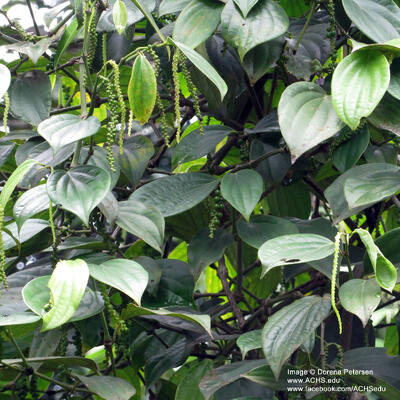 Volatile monoterpenes (such as pinene, thujene, camphene, sabinene, limonene, phellandrene, and carophylene), aldehydes (such as piperonal), and the lighter alcohols linalol and pinocarvol are all present in this wonderful oil and provide a therapeutic cocktail. If you need a topical analgesic think black pepper oil. It is great after exercise and can actually improve endurance.
Volatile monoterpenes (such as pinene, thujene, camphene, sabinene, limonene, phellandrene, and carophylene), aldehydes (such as piperonal), and the lighter alcohols linalol and pinocarvol are all present in this wonderful oil and provide a therapeutic cocktail. If you need a topical analgesic think black pepper oil. It is great after exercise and can actually improve endurance.
Two separate studies, one performed in 2008 and one in 2009, tested the essential oil of black pepper for its antioxidant activity. Both studies found the essential oil to be highly antioxidant as a free radical scavenger. The carbon dioxide extract was found to be more antioxidant than the steam distilled essential oil[1][2].
(As a side note ... while we are on the antioxidant kick ... if you are a smoker trying to quit, think black pepper! Some of my travel companions reported that inhaling black pepper essential oil significantly reduced cravings for cigarettes—so crank up those aromatherapy essential oil diffusers and throw out the cigarettes.)
My meditative moments under the black pepper vine high up in the wet monsoon-drenched mountain forest in Kerala were interrupted when I heard, “Come on Dorene! The bus is leaving!" I closed down my camera and slid back down the slope with only two large bunches of fresh bright-green pepper to chew on for the remainder of the bus ride.
My slippery hike left me stiff, so when we reached our hotel later that night I whipped up this blend from my mini Essential Oil First Aid Travel Kit from the Apothecary Shoppe.
Muscle Ache Rub Recipe
- Black pepper Piper nigrum oil: 4 drops
- Bay Laurus nobilis: 2 drops
- Marjoram Origanum majorana oil: 2 drops
- Juniper Juniperus communis oil: 2 drops
- Ginger Zingiber officinale oil: 2 drops
- Sweet almond oil: 5 mls
- Directions: Blend all oils together and massage vigorously onto the painful area.
When I woke to heavy monsoon rains very early the next morning, ready for the next adventurous day, I chewed on another fresh green pepper, rubbed on some more Muscle Ache Rub, and headed out.
Cardamom, cocoa, and sandalwood were still on my bucket list!
References
[1] Kapoor, I.P., Singh, B., Singh, G., De Heluani, C.S., De Lampasona, M.P., & Catalan, C.A. (2009). Chemistry and in vitro antioxidant activity of volatile oil and oleoresins of black pepper (Piper nigrum). J Agric Food Chem., 24;57(12):5358-64.
[2] Topal, U., Sasaki, M., Goto, M., & Otles, S. (2008). Chemical compositions and antioxidant properties of essential oils from nine species of Turkish plants obtained by supercritical carbon dioxide extraction and steam distillation. Int J Food Sci Nutr., 59(7-8):619-34.

